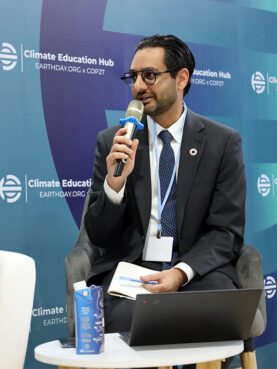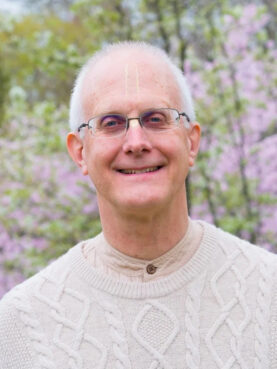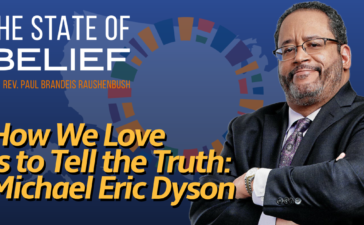NEW YORK (RNS) — For faith-based environmentalist and U.N. adviser Gopal Patel, first came faith, then came environmentalism.
“Krishna was always God for me,” said the U.K. native, a member of the International Society for Krishna Consciousness, or ISKCON, commonly known as the Hare Krishna movement. Patel remembers watching the popular 1993 Hindi-language TV series “Krishna” by Ramanand Sagar based on stories about the life of the Hindu deity.
“I remember asking my mom, like, is that the real Krishna?” he said.
Decades later, inspired by Hare Krishna teachings about humanity’s relationship to the environment, Patel is on a mission to convene faith representatives around issues of biodiversity and land and ecosystem restoration causes, as put forth by the three Rio Conventions. On Thursday (Sept. 26), as part of U.N. Climate Week in New York, Patel hosted a multifaith action and advocacy meeting. There, institutions including the Baha’i International Community, the Anglican Communion and Soka Gakkai International signed a Triple COP Call to Action statement.

Gopal Patel participates on a panel at COP27 in Sharm El Sheikh, Egypt, in November 2022. (Courtesy photo)
Now based in Montclair, New Jersey, Patel, who served on the United Nations Multi-faith Advisory Council, was raised in the northwest London town of Watford, a place recognized in part for the Bhaktivedanta Manor, an ISKCON temple donated in the early 1970s by George Harrison. Patel co-founded the Bhumi Project, later Bhumi Global, in 2009 — a first-of-its-kind initiative out of the Oxford Centre for Hindu Studies to mobilize Hindu groups, leaders and communities around the world for environmental issues, or what Patel calls “engaged faith.”
Many Hindus were talking about the environment only in an abstract way, Patel said, worshipping Bhumi, the Earth goddess, or the river Ganga in India, considered sacred.
“But we weren’t talking about it in terms of, like, ‘We need to clean up rivers,’ or ‘We need to, like, protect the environment,’ or like, you know, not take plastic bags on pilgrimage,” he said. “We like to think that we played some role in most Hindu organizations now talking about the environment in a very concrete way.”
Earlier this year, Bhumi Global shut its doors. (“It’s a Hindu thing,” he said. “Everything comes to an end. Nothing lasts forever.”) But by his stepping down, Patel said, a new generation of change makers can step up. The possibilities excite him.
Young people are more likely than older generations to say climate issues are an environmental crisis that needs attention. Patel believes a lot of young people unaffiliated with religions are nonetheless “crying out” for a moral framework to make sense of the crisis. And he believes that gives faith communities key roles to fill in the environmental movement.
“The biggest thing faith communities can do is ‘read the room’ and see what younger people are looking for, craving for, and ask, ‘What are other sectors doing that we can learn from, and how can we partner to move things forward?’” Patel said.
But for Patel as a young spiritual seeker, faith certainly took precedence over any high-level climate concerns.
Although culturally Hindu in upbringing, 41-year-old Patel found his own path to what he calls “engaged spirituality” at age 16, when he first came across the “Bhagavad Gita As Is,” a translation of, and commentary on, the ancient Vedic scripture by ISKCON spiritual leader A. C. Bhaktivedanta Swami Prabhupada. The interpretation teaches a devotional path to Krishna, a personal god. “By the time I finished reading that, I kind of said to myself, ‘This is something I want to dedicate my life to.’”

Gopal Patel at the TED Countdown Summit in Detroit, July 14, 2023. (Photo by Jasmina Tomic/TED)
The book also has clear teachings on the treatment of the natural environment that resonated with the young devotee. The Gita preaches ahimsa, the nonharming philosophy that prevents many Hindus from eating animal products. And it explores the concept of dharma, or duty, which instructs the faithful to “uphold the natural order, the natural balance of the world, of the planet, of the environment.”
“One really important understanding is that we are in relationship with the natural world,” Patel said, “and I think that’s something very profound, not just within Hinduism, (but) other dharmic faiths, and also Indigenous traditions and other world religions as well. What is your relationship with the natural world? How much are you taking? How much are you giving back? How much are you protecting? Is it a relationship of harmony and balance and coexistence, or is it a relationship of exploitation?”
Patel studied computer science in the dot.com boom and immediately left for India after college to spend nine months in various ISKCON ashrams. He lived on the holy Ganges river and traveled across the country, witnessing the “clean and pristine” nature that was still “largely untouched by modernity.” And after obtaining a master’s degree back in England, he permanently moved into the ISKCON temple in his hometown.
There, Patel began thinking of the work that has characterized his last 15 years.

Anuttama Dasa. (Photo courtesy of ISKCON)
“The Vaishnava tradition teaches that everything in this world is the property of God,” said Anuttama Dasa, ISKCON director of international communications and a longtime friend of Patel. “We are spiritual beings living in the material world, we’re all just passing through here, and we should care for the world, because it’s not ours to exploit. We all have the right to live and appreciate the gifts of God.”
Across the world, the Hare Krishna movement has over 650 temples to its name worldwide. And in India, Hungary and Pennsylvania, the group has sprawling eco-farms, where devotees live off the land, help local residents plant sustainable crops and even, in the latter case, hold the USDA’s only certified slaughter-free dairy farm. Dasa also credits Hare Krishna Food for Life, the world’s largest vegetarian food distribution program, for “introducing large-scale vegetarianism to America before vegetarianism was hip.”
Having a member of ISKCON represent the tradition at the global environmental scale, sitting among global faith groups, is incredibly important, Dasa said. But even for religions with clear theology about the environment, “the harder part sometimes is going back to your own congregation, your own temples, synagogues, and saying, ‘OK, people, let’s step up,” he added.
Patel agrees. Looking back at the tenure of Bhumi Global, which started with initiatives such as “greening Hindu temples,” he feels a strong sense of pride. But still, he said, religious institutions have more work to do in connecting the spiritual and theoretical with more solutions-oriented insights into the public square.
“We believe no single religious or spiritual tradition has a monopoly on the truth, and that solving the environmental crisis requires everyone to work together,” reads the Bhumi Global mission statement.
“We need to start finding solutions and implementing them at speed, and we need to start doing them at scale,” Patel said. “And faiths do not move at speed. They have scale, but the scale takes a really, really, really long time. So let’s partner with faith and youth groups, faith and women led-groups, faith and the business community. The crisis isn’t going to be solved by one sector.”





